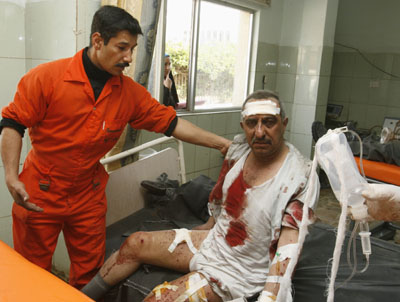Iraq VP narrowly escapes assassination
(Agencies)Updated: 2007-02-27 08:36
Baghdad - Iraq's Shiite vice president narrowly escaped assassination Monday as a blast ripped through a government meeting hall just hours after it was searched by US teams with bomb-sniffing dogs. At least 10 people were killed.
Adel Abdul-Mahdi was slightly wounded in the explosion, which splintered chairs, destroyed a speakers' podium and sent a chilling message that suspected Sunni militants can strike anywhere despite a major security crackdown across Baghdad.
The bomb, possibly hidden in the podium, went off moments after the minister for public works finished a speech in the third-floor chamber, witnesses said. Abdul-Mahdi had made a welcoming address a few minutes earlier, raising speculation the bomb could have been on a timer-trigger that missed the vice president by sheer luck.
Among those killed were several ministry employees, police said. More than 25 were wounded, including the public works minister, Riyad Gharib.
Abdul-Mahdi, smothered by his bodyguards in an instant, suffered minor leg injuries and was hospitalized for tests, his office said. He was later released.
"I heard a big explosion," said Tagrid Ali, a public works ministry employee who attended the gathering to honor outstanding workers. "I fell to the ground, and the whole place was filled with black smoke."
Suspicion for the attack fell on Sunni insurgents, who have waged nonstop bombings and attacks against Iraq's majority Shiites for cooperating with the US-backed government.
Adbul-Mahdi is one of two vice presidents. The other, Tariq al-Hashemi, is Sunni.
An Associated Press photographer witnessed security forces hustling a man from the building, but there were no immediate reports of any arrests.
"The aggression against you this day is further proof that these groups are doing their best to destroy Iraq's unity," said a message to the vice president from Abdul-Aziz al-Hakim, who heads the country's largest Shiite political group.
Even as Iraqis learned of the attack, word was coming from neighboring Jordan that their president, Jalal Talabani, was facing more medical tests.
Talabani, from Iraq's Kurdish north, was taken to Amman after falling unconscious Sunday. His son, Qubad Talabani, said the 73-year-old leader was "up and about" and blamed the episode on fatigue and exhaustion.
"He'll be back in Baghdad soon," added Foreign Minister Hoshyar Zebari.
But his private physician, Dr. Yedkar Hikmat, would give no timetable on his discharge, saying only that rumors Talabani had heart problems were "categorically wrong."
The bombing of the municipal building was another blow to claims by US and Iraqi forces that a nearly 2-week-old security sweep across Baghdad is making headway. On Sunday, more than 40 people were killed in a suicide blast at a mostly Shiite college.
Criticism of the security plan is getting louder.
Al-Hashemi, the Sunni vice president, said the security plan does not treat all groups equally, an apparent reference to Sunni complaints that they are facing the most pressure and attention.
"Up to now, legal procedures have not been observed," he said in an interview. "The human rights of Iraqis have not been respected as they should be."
Al-Hashemi also said he warned US officials during a visit to Washington in December that sectarian rivalry had paralyzed the unity government and the White House must study alternatives if its current security strategy fails.
"I was very frank with the American administration. I encouraged them to think seriously about `Plan B,'" he said. "What sort of alternative do we have in the future in case the current security plan fails?"
In Ramadi, 70 miles west of Baghdad, a suicide bomber driving a stolen ambulance packed with explosives struck outside a police station, killing at least 14 people and wounding 10, police said.
In Baghdad, al-Maliki's Cabinet signed off on a proposed new oil law that would divide revenues among all Iraqi factions. It now moves to the Shiite-dominated parliament for a final vote.
Secretary of State Condoleezza Rice has stressed the importance of making rapid progress on the oil law as a way to strengthen unity in the deeply fractured nation and encourage foreign investment in one of OPEC's former heavyweights.
Iraq's Appeals Council, meanwhile, agreed to review the case of Saddam Hussein's deputy, Taha Yassin Ramadan, who was sentenced to death by hanging Feb. 12 for his role in the massacre of Shiite civilians in 1982 following an assassination attempt against the former Iraqi leader.
|
||
|
||
|
|



